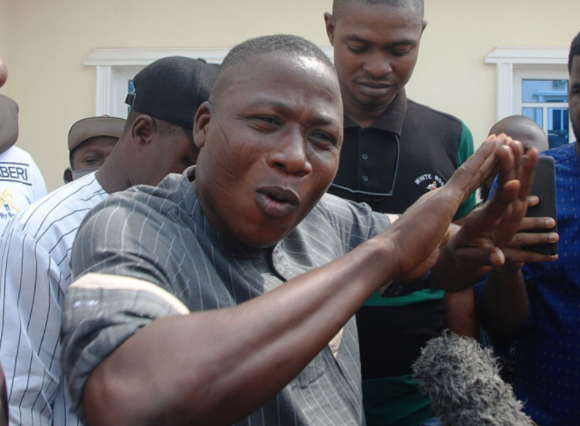It is a question that has been on the minds of many people for long. How did the APC and her “Change” mantra made so much impact? How did it travel so vast and fast? And how was it able to usher in real change in an unprecedented manner even, where an incumbent ruling administration was substituted with “The Opposition”. How did the APC win the 2015 elections?
I accidentally bumped into an explanation I find suiting for this phenomena while reading Malcom Gladwell’s Tipping Point.
Gladwell believes “Ideas and products and messages and behaviors spread just like viruses do”, he thinks of their spread as conforming with the principles of epidemics. One of the major attributes of epidemics is the fact that they can “rise and fall in one dramatic moment”. As we’ve seen with epidemics like that of Measles, Chicken Pox, Meningitis etc; there’s always a moment where a sudden hike in cases in experienced(or a sudden fall). This particular moment, “when everything can change all at once” is what Gladwell refers to as the Tipping Point.
2015 was indeed a tipping point for the opposition parties in Nigeria. For 16 years, the then ruling PDP never gave any opposition the chance to smell the presidency. It was as though PDP would continue to rule for as far as Nigeria continues to be a Democracy. Infact, in different occasions, PDP adherents like Prince Vincent Ogbulafor, Gen Ibrahim Babangida, Patience Jonathan had attested to the fact that PDP was designed and conceptualised to rule Nigeria for 60 years.
Advertisement
But the Tipping Point for PDP was 2015. And the agent that forced PDP to the Tipping Point was APC with its “Change” Mantra.
But how did the APC achieve tipping down a 16 years old phenomenon?
The answers lie in the idea that epidemics that lead to tipping points are driven by some certain factors or agents. Gladwell believes these factors are; “The Law of the Few”, “Stickiness Factor” and the “Power of Context.” And the APC employed communication strategies that appreciated the Tipping Point driving factors as stated above.
Advertisement
The Law of the Few conforms with the Pareto Principle which suggests that most times, roughly 80% of consequences or outcomes or results come from 20% of causes or efforts or even actions of people. This law as conceptualized by Gladwell suggests that “The success of any kind of social epidemic is heavily dependent on the involvement of people with a particular and rare set of social gifts”. These people, he said, are categorized into three groups namely; The Connectors, the Mavens and the Salesmen.
Our social cycles are broad and filled with many people but on appraising all the people we know, we would realize that we came to know most of them through a few out of all the people we know. To validate this, a psychologist, Stanley Milgram conducted an experiment and it birthed the concept of “Six Degrees of Separation” and it simply infers that “a very small number of people are linked to everyone else in a few steps, and the rest of us are linked to the world through those special few”. And these “Special Few” are the CONNECTORS. These connectors are seen as the most fastest spreaders of messages or ideas or products or behaviors in mostly what is termed as the “Word of Mouth” epidemic. And because they connect us all, the epidemics spread fast and vast in a short period of time.
The MAVENS on the other hand are those people among us who are exceptionally good at gathering information and spreading it effortlessly with the sole purpose of serving as relief for people who are not handy with information but need it to make their lives easy. They are usually people’s natural choices whenever they need to seek advices. In Gladwell’s words, “Mavens are data banks in a social epidemic. They provide the message(information) while Connectors are social glue: they spread it”.
The third and last(but definitely not the least) of these “Special Few” are the SALESMEN. They are the natural persuaders. Consider them as those people who have the natural skills of convincing us to accept the messages or information or ideas the Mavens have provided and the Connectors have spread. Their roles in social epidemics are just as important as that of the first two. One of the most amazing attributes of this group is that they could persuade you not only through verbal means but also through subtle non-verbal ways.
Advertisement
How would you react when you understand that it has been empirically proven that towards a particular election, viewers of a particular channel majorly voted for a certain contestant because the newscaster for that channel usually tend to smile a little bit whenever he reads a news item that had to do with that contestant? That explains the importance of subtle non-verbal communications and the idea of “cultural microrhythms” in the art of persuasion. Salesmen tend to persuade us in ways we never appreciate, from “interactional synchrony” through systematic and effortless “motor mimicry” to “emotional contagiousness”; they are just exceptionally good at leveraging on these subtleties to persuade people.
Now, this perfectly applies to the Nigerian political context especially towards the 2015 elections. One attribute of Connectors is the fact that they are rallying points. They are seen as unifiers. A person can also fit in as a connector and a maven or a salesman at the same time. The APC simply had enough Connectors, Mavens and Salesmen.
Think of the most popular names you knew in the APC, The Buhari, The Tinubu, The Kwankwaso, The Ameachi, The Elrufai, The Bakare and many others. Think of those former Generals that supported the APC from the shadows. They all of fit into one category of the “Special few” or the other. The APC message resonated because the Connectors amplified it. It traveled fast and wide because we had Mavens recommending it everywhere. And it got vastly accepted because there were enough Salesmen out there persuading people both in bold and subtle non verbal terms.
Yes, some “special few” are needed to spark a social epidemic and sell a message or an idea far and wide in a tremendously fast manner. But Gladwell argues that something else is needed for that message or idea to influence people to act. The APC message might have spread very fast and wide, but it needed another ingredient to spur action in people to vote out a 16 years old ruling party. And for the message to be successful, it needed to be memorable and for it to be memorable it needed to “stick”. How the message really “stuck” is what the second factor that leads to tipping points explains; this factor is termed the “Stickiness Factor”.
Advertisement
However, the “Stickiness Factor” in this case was complimented and augmented by the third factor which is the “Power of Context”. The “Power of Context” factor is simply hinged on the idea that “Epidemics are sensitive to the conditions and circumstances of the times and places in which they occur” and that “behavior is a function of social context” for “there are specific situations that are so powerful that they can overwhelm our inherent predispositions”.
The APC message was “sticky” because it was packaged in such a way that it could be transmitted in a fast and unique way using a mantra that embodies everything the APC was out to achieve. That mantra was “Change”. And the “Change” mantra resonated and spurred action the way it did because the characteristics that defined pre-2015 environment conformed with the kind of conditions and circumstances that could be propelled by the “Power of Context”.
Advertisement
Think of it this way. The environment was defined by insecurity and was ravaged by several acts of violence and crime. This was the context. And what the people simply needed was a “change” from this situation. The economy was in a relatively poor state and all the people wanted was a “change” from the sorry situation of the economy. The environment was defined by stark corruption and all the people wanted was a “change” from this condemnable situation. On appraisal, the pre-2015 environment was a reflection of a situation where all the people wanted was a paradigm shift in almost all ramifications; a “Change”. Hence, the effectiveness of the “Change” mantra.
The combination of the “Law of the Few”, the “Stickiness Factor” and the “Power of Context” propelled the APC message and idea into prominence and it gave way for the realization of a “Tipping Point” for the 16 years old PDP phenomenon.
Advertisement
Could the PDP employ same strategy to force APC to a Tipping Point come 2023? For as Gladwell clearly puts it, “there are exceptional people out there who are capable of starting (social)epidemics. All you have to do is find them. And there is (always) a simple way to package information that, under the right circumstances, can make it irresistible. All you have to do is find it.
Ringim, a political and public affairs analyst, writes from Zaria and can be reached through [email protected]
Advertisement
Views expressed by contributors are strictly personal and not of TheCable.
Add a comment







